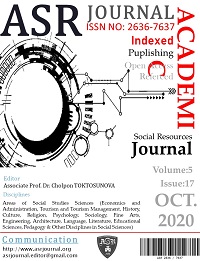Author :
Abstract
Teknolojik gelişmeler ve endüstri devrimlerine bağlı olarak oluşan sosyal toplum düzenleri eğitim sistemlerine de etki etmektedir. Endüstri 4.0 ve sosyal düzeni toplum 5.0’ın eğitime etkisi; Eğitim 4.0 olarak tanımlanmaktadır. Bu araştırmanın amacı, eğitim 4.0 ve bileşenleriyle ilgili mevcut eğitim sistemimizin durumunu değerlendirmek, eğitim 4.0 boyutlarının çeşitli değişkenlere göre (cinsiyet, sınıf düzeyi, branş, kıdem) anlamlı farklılık gösterip göstermediğini araştırmaktır. Araştırma tarama (survey) türlerinden betimsel araştırma modelinde tasarlanmıştır. Araştırma verileri 114 (lise) öğrencisi ve (liselerde görev yapan) 121 öğretmenden alınmıştır. Katılımcıların en düşük düzeyde gördükleri boyut; öğrenci katılımlı müfredat boyutu olmuştur. Öğretmenlerin cinsiyete göre kişiselleştirilmiş öğrenme ve öğrenim esnekliği boyutlarında erkek öğretmenler lehine anlamlı farklılık bulunmuştur. Zamana ve mekâna bağlı olmayan eğitim, proje bazlı öğrenme (maker), veri yorumlama, geleneksel değerlendirme yerine sürekli izleme, öğrenci katılımlı müfredat, rehberlik odaklı ve değerler eğitimi boyutlarında cinsiyet, branş ve kıdeme göre anlamlı farklılık bulunmamıştır. Öğrencilerin cinsiyet ve sınıf düzeylerine göre ise anlamlı farklılık bulunmamıştır.
Keywords
Abstract
Social orders of communities which are formed in connection with technological advancements and industrial revolutions have an impact on educational systems. The influence of industry 4.0 and its social order, society 5.0, are defined as Education 4.0. The aim of this research is to evaluate the current condition of our educational system in regards to education 4.0 and its constituents and find out whether the dimensions of education 4.0 shows significant differences in terms of particular variables like gender, grade, branch and experience or not. The study is designed in accordance with descriptive research model which is one of the survey types. Research data is collected from 114 high school students and 121 teachers who are also working in high schools. The lowest score is observed to be assigned by the participants to the dimension of curriculum with student participation. It is found out that there is a significant difference on behalf of male teachers in the dimensions of personalized learning and flexibility of learning in terms of gender. No significant difference is observed in the dimensions of education beyond time and space, project-oriented learning, data interpretation, constant monitoring instead of traditional evaluation, curriculum with student participation, guidance-based learning and values education in terms of gender, branch and experience. Furthermore, there appears to be no significant difference in terms of gender and grade in any dimensions.
